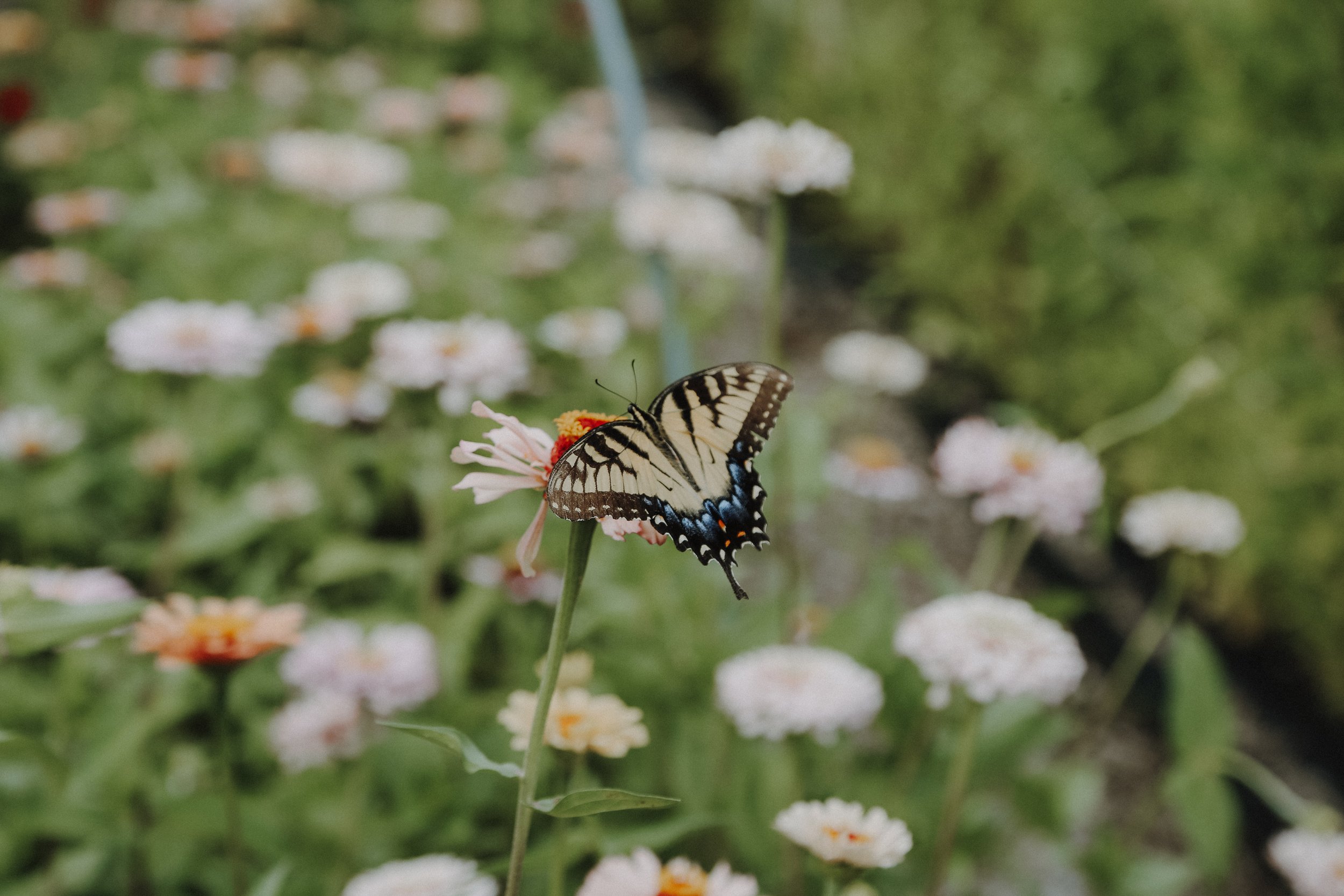
Sustainability
-
At our farm, we do not use pesticide or herbicide chemicals of any kind. All of our goods are grown using natural inputs. You can feel good about what you take home from us to your loved ones.
-
We are living in a crisis of single-use plastics. We are proud that our flowers and veggies are packaged PLASTIC FREE, and in most cases are fully compostable.
We use certified compostable baggies (BioBag) for our flower bouquet water source. Our bouquets are wrapped in paper, tied with natural raffia, and stamped with our logo (no plastic stickers). Occasionally, we will use a reused rubber band to bind your flowers which you can keep and reuse again.
We also have an option to receive flowers in a second-hand, thrifted vase or mason jar.
-
We aim to grow 90% or more flowers for each wedding we take on.
Imported flowers wholesale are massively wasteful, harmful to the environment, grown using toxic chemicals, human exploitation, and so much more.
When couples book our wedding floristry, they receive chemical-free seasonal flowers grown right here at our farm. Our favorite weddings are ones where we grow 100% of what is required to achieve their wedding day vision.
We do not use floral foam, which is single-use plastic that contains harmful chemicals, and that the U.S. EPA has classified as a probable human carcinogen. Floral foam is a dense plastic brick often used by florists for creating floral installations and other arrangements.
Instead, we use things like chicken wire, water picks, gridded cages that hold flowers in position.
After the wedding, flowers left over are composted at our farm.
-
Other ways we are sustainable and earth-friendly include:
Solar powered farm from Solar by Ecos
Natural soil building with compost, and low to no-till. Instead we rely on manual broadforking of soils to break up our compacted soils from years of previous industrial soybean farming.
Wildlife and pollinator habitat, such as maintaining our wildflower prairie, installing pollinator / bird houses, and encouraging their ecosystem within our farm.
Most of all, we remain committed to growth in our climate action. There is always more we can do.
Sustainability and environmental stewardship has never been so important.
“But what can I do? I’m just one person”
Often a feeling of helplessness arises as it relates to the environment, because the issues we face feel much bigger than what we can solve. And while that may be true, there are plenty of ways and small acts that when done consistently can make a huge difference.
Here are some simple ideas:
-
Do you really need it? If you think you do, leave it in your online cart for a few weeks and check back to see how you feel. Odds are, you will feel less inclined to buy it.
-
For clothes: Depop, Poshmark, and local thrift stores.
You can use something that already exists rather than buying new!
-
Invest in items that will last and can be used for years rather than cheap throw away items.
Try to fix it! Look up how the item can be repaired. Mend shirts instead of throwing them away.
-
Did you know most plastics are not recyclable?
Bring a cup when you go to any coffee shop, most are happy to use yours and often times will give a discount. Decline straws. Decline plastic cutlery. Decline plastic bags.
Bring your own bags to the grocery store, or ask for paper bags. Or if it’s just a few items, decline a bag altogether.
-
On a nice day, turn off your AC and heat to save power (and money!)
Invest in windows, insulation, and seal up drafty spots in doorways.
Use less water as much as possible, and be mindful of what goes into your drains.
-
Whenever possible, seek out companies with consumer products that prioritize sustainability! Look for companies that are packaging plastic-free. Look for goods that are certified organic. Look for companies that are Fair Trade and prioritize worker livelihoods.
-
Vote for officials who are committed to climate action.
-
If you can, grow a garden. Grow your own food. Grow your own flowers.
It’s not as daunting as you might think! And if it fails, it’s not the end of the world. Give it a try!
-
Your local businesses need you. Your local farmers need you. When you do need to buy goods, please try local first. It means more.
Do your part.
Do your part.
Contact us.
Questions or comments about our sustainability or yours? We are happy to help as best we can!


